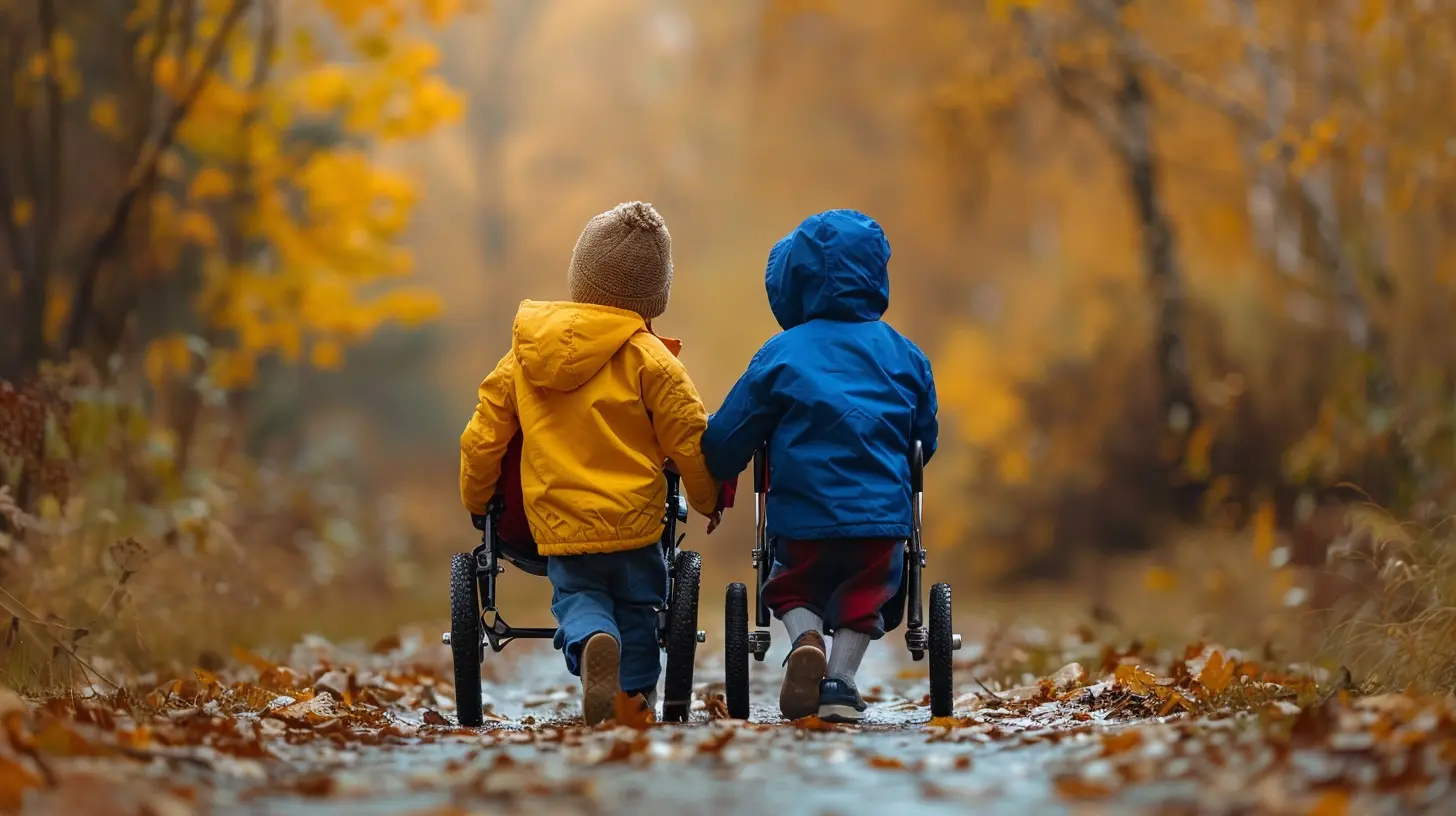How to Help Children with Special Needs Form Meaningful Friendships
23 June 2025
Friendships are a crucial part of childhood. They bring joy, build confidence, and help children develop essential social skills. But for children with special needs, making and keeping friends can sometimes be challenging. As parents, caregivers, and educators, we have the power to help them build meaningful friendships that can last a lifetime.
In this guide, we'll explore practical ways to support children with special needs in forming and maintaining friendships. From understanding their unique challenges to creating opportunities for social interaction, let's dive deep into how we can make a difference in their social lives.

Understanding the Challenges
Before we jump into solutions, it's important to recognize the obstacles that children with special needs may face when trying to make friends. These can include:- Social Anxiety – Some children may feel nervous or unsure about starting conversations or joining group activities.
- Communication Barriers – Kids with speech delays, hearing impairments, or autism may struggle to express themselves or interpret social cues.
- Sensory Sensitivities – Loud noises, bright lights, or crowded places might be overwhelming for some children, making social interactions difficult.
- Behavioral Differences – Certain conditions might lead to impulsive behavior, making it harder to connect with peers in traditional ways.
Understanding these hurdles allows us to better support them in forming genuine friendships.

Encouraging Social Skills Development
One of the best ways to help children with special needs form friendships is by actively working on their social skills. These skills don’t always come naturally, so they may need a little extra practice.1. Teach Social Cues and Body Language
Many children with special needs have difficulty understanding nonverbal cues like facial expressions, tone of voice, or body language. Role-playing different social scenarios can help them recognize these cues better.For example, you can:
- Use emotion flashcards to help them identify feelings.
- Watch short videos together and pause to discuss what emotions the characters might be feeling.
- Practice greetings, introductions, and polite conversation starters.
2. Encourage Turn-Taking and Sharing
Friendships often involve give-and-take, but this concept can be tricky for some children. Practicing turn-taking through games or structured play can reinforce the importance of sharing and fairness.Try playing board games, card games, or even interactive storytelling, where each person adds a part to the story. These activities help children learn patience while making social interactions more enjoyable.
3. Use Social Stories
Social stories are short, simple narratives that describe social situations in a way that children can easily understand. They help children know what to expect in certain interactions, reducing anxiety and confusion.For example, a social story about "How to Ask a Friend to Play" might include illustrations showing how to approach a peer, ask to join in, and react to different responses.

Creating Opportunities for Friendship
Sometimes, children with special needs just need the right environment to form friendships naturally. Here are some practical ways to create these opportunities.1. Find Inclusive Activities and Hobbies
Look for sports teams, art classes, or clubs that emphasize inclusion. Activities like music, swimming, and martial arts often encourage teamwork and provide structured ways for children to interact.Many organizations offer programs specifically designed for children with special needs, ensuring they have access to meaningful social experiences with peers who accept them for who they are.
2. Organize Playdates
One-on-one playdates can feel less overwhelming compared to large group activities. Choose an environment where your child feels comfortable, such as your home or a familiar park.Here are some tips for successful playdates:
- Keep the activities structured (e.g., crafts, baking, or a planned game).
- Start with shorter timeframes and gradually extend them.
- Choose a friend who is patient and understanding.
- Offer gentle guidance if needed but allow independence.
3. Encourage Buddy Systems at School
Schools can be a great place to foster friendships, but sometimes children with special needs feel isolated. Work with teachers to create a buddy system where a peer is paired with your child for certain activities.Having a buddy during lunch breaks, recess, or group projects can boost confidence and make social situations feel more manageable.
4. Teach Peers About Inclusion
Many children simply don’t understand disabilities, which can create an unintentional social divide. Educating classmates about special needs in a gentle, age-appropriate way can foster empathy and inclusivity.You can suggest that teachers hold classroom discussions about kindness, acceptance, and understanding differences. When children know how to interact and appreciate each other’s uniqueness, friendships can bloom naturally.

Supporting and Nurturing Friendships
Once a child forms a friendship, maintaining it is just as important. Friendships require care, patience, and understanding. Here are ways you can support ongoing friendships:1. Help with Conflict Resolution
Disagreements happen in every relationship, and children with special needs may need help navigating them. Teach simple conflict resolution strategies, such as:- Taking deep breaths before reacting.
- Using "I feel" statements instead of blaming (e.g., "I feel sad when you don’t share with me").
- Finding compromises that work for both friends.
2. Celebrate Social Successes
Even small social victories—like making eye contact, asking a friend to play, or remembering a peer’s name—deserve recognition. Praise these moments to reinforce positive social behavior and boost confidence.3. Model Healthy Friendships
Children learn a lot by observing. Show them what a healthy friendship looks like through your own relationships. Demonstrate kindness, listening skills, and empathy in your interactions with others.4. Encourage Communication Outside of School
Friendships don’t have to be limited to school hours. Help facilitate other forms of communication, such as:- Setting up virtual playdates or video chats.
- Encouraging letter writing or sending drawings to friends.
- Inviting friends to small weekend activities, like going to the park or seeing a movie together.
The Power of Unconditional Support
At the end of the day, what matters most is that children with special needs feel supported, loved, and accepted for who they are. Friendships don’t need to look like everyone else’s to be meaningful. Even one solid friendship can make a world of difference in a child’s life.Your role as a parent or caregiver is to provide guidance, encourage opportunities, and celebrate progress—no matter how big or small. With time, patience, and the right environment, children with special needs can form deep, fulfilling friendships that enrich their lives.
Final Thoughts
Helping a child with special needs form meaningful friendships takes effort and sometimes creativity, but the rewards are well worth it. Every child deserves to experience the joy of companionship, the support of a friend, and the beauty of belonging. So, keep encouraging, keep supporting, and watch as their social world blossoms in ways you never imagined.all images in this post were generated using AI tools
Category:
Special NeedsAuthor:

Steven McLain
Discussion
rate this article
2 comments
Pierce McAdoo
Empower your child to embrace their uniqueness! Nurture connections through understanding, compassion, and patience, fostering friendships that celebrate differences and build confidence.
October 23, 2025 at 4:51 PM

Steven McLain
Thank you for your insightful comment! Embracing uniqueness is indeed key to helping children with special needs build strong, meaningful friendships.
Elidi Ortiz
This article offers invaluable insights on fostering meaningful friendships for children with special needs. It emphasizes understanding each child's unique needs, promoting inclusive environments, and encouraging open communication. Practical tips and real-life examples make it an essential read for parents seeking to enhance their child's social connections.
June 23, 2025 at 4:29 AM

Steven McLain
Thank you for your insightful comment! I'm glad you found the article helpful in supporting children with special needs in building meaningful friendships.


